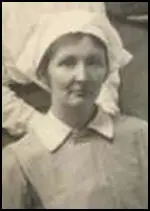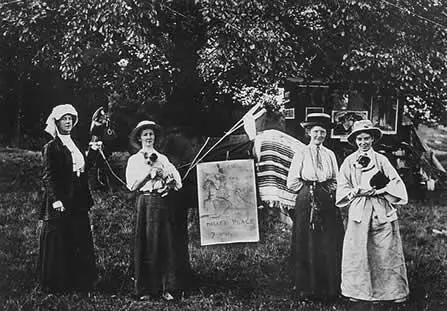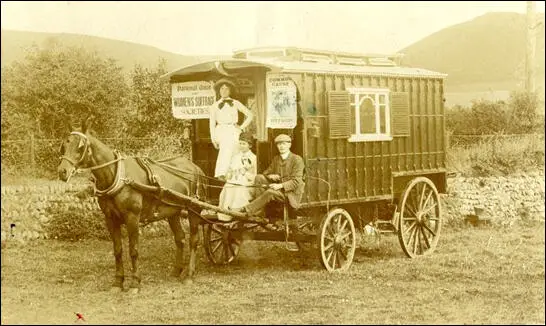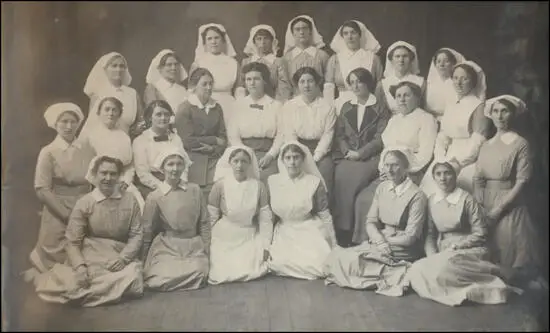Helga Gill

Helga Gill, the daughter of Johan Klerk Gill and Karen Marie Ottilia Gill, was born on 9th April, 1885, in Bergen, Norway. She was their oldest of six children. Her mother died in 1900 and as a teenager helped raise her brothers and sisters. (1)
Gill became involved in the campaign to achieve women's suffrage in Norway. In 1907 women who could establish a minimum income of their own and those who are married to a voter, could take part in national elections. (2)
Helga Gill visited England in 1908 and went to live with Charles Corbett, Marie Corbett, Margery Corbett and Cicely Corbett at their home of Woodgate, in Danehill, Sussex. She joined the National Union of Women Suffrage Societies (NUWSS). Gill toured the country giving talks on how women's suffrage was achieved in Norway. (3)
Helga participated in the Worcester by-election in 1908, speaking to local audiences and putting pressure on candidates to declare whether or not they supported women’s suffrage. The Conservative Party candidate, Edward Goulding, was totally opposed to giving women the vote. The Liberal Party candidate, Harold Elverson, was more sympathetic to the cause, but he was defeated by 4,361 votes to 3,069. (4)
Helga Gill and the NUWSS
At a meeting at Ampthill in October 1909 she explained why women should have the vote: "She proceeded to show how the classes and masses had one by one claimed their right to vote for their representatives, and how women of all the nation were now alone shut out from this privilege, though they had been striving for over forty years to obtain it. She knew that it was said by many that home was the woman's place, and she agreed with that, but pointed out that home was the place most affected by politics, since, after all, the State was only a collection of homes, and all laws that were passed affected, in some way or other, the individual home."
Gill claimed that women were being exploited. The Bedford Mercury reported: "Miss Gill then called attention to the manner in which women were affecting the labour market. The thousands of women who were compelled by circumstances to earn their own living were being paid at a lower rate of wages than men, and as their labour could be got more cheaply, employers were using them to the detriment of men and of trade. This would not be altered until women could combine to demand attention to their needs, and the surest way of compelling attention was to let them vote, the Members of Parliament would discover that women were a force to be reckoned with and would consider them in their pledges to their constituents." (5)

In 1911 Helga Gill, Cicely Corbett, Marie Corbett, Margery Corbett Ashby, Muriel, Countess de la Warr, Rosalind Gray-Hill (also Secretary of the International Women's Franchise Club), Grace Dykes Spicer and Lila Durham formed the East Grinstead Suffrage Society. In the 1911 Census returns Gill, Gray-Hill and Spicer were all living with the Corbetts at Woodgate, Danehill. (6)
Gill was now employed by the National Union of Women Suffrage Societies as a touring lecturer. At a meeting held in Coventry she attacked the activities of the Women Social & Political Union. The local newspaper, The Coventry Evening Telegraph reported: "The Society she represented was not composed of what were called militant suffragettes… Their side was not reported by the papers, but if they got on the roof of a building and created a scene then the papers would report this.... One questioner asked the lecturer whether she thought the women's suffrage question would have been brought to the front so much as it had if it were not for the militant tactics which had been adopted… Miss Gill said it was a difficult question to answer. Militant tactics had probably brought the question to the front as one of public importance in the Press, but her Society was very much against such methods as had been adopted." (7)

Helga Gill developed into one of the most important NUWSS lecturers. She drove a horse-drawn caravan around the country selling copies of Votes for Women. By 1912 she was appointed as the NUWSS organiser for Oxford, Berkshire, and Buckinghamshire. (8) Gill was sent on a tour of Ireland by the NUWSS to promote women's suffrage. In January 1914 the NUWSS employed her as an organiser at a salary of £120. (9)
First World War
On the outbreak of the First World War in 1914 Eveline Haverfield founded the Women's Emergency Corps, an organisation which helped organize women to become doctors, nurses and motorcycle messengers. Dr. Elsie Inglis, one of the founders of the Scottish Women's Suffrage Federation, suggested that women's medical units should be allowed to serve on the Western Front. With the financial support of the National Union of Women's Suffrage Societies (NUWSS), Inglis formed the Scottish Women's Hospitals Committee. Dr. Elsie Inglis and her Scottish Women's Hospitals Committee sent the first women's medical unit to France three months after the war started. By 1915 the Scottish Women's Hospital Unit had established an Auxiliary Hospital with 200 beds in the 13th century Royaumont Abbey. (10)
Helga Gill volunteered her services and joined the the Scottish Women's Hospital unit as an X-ray operator in Royaumont 50 kilometres from the Front Line. Later she served as an ambulance driver, where she risked her life transporting injured soldiers from the front-line to the Auxiliary Hospital and was often "in danger of being killed by shells." (11) According to her friend Margery Corbett Ashby: "Between the line and the hospital her back wheels were shot away, her driving wheel was splintered between her hands". (12)

of the Scottish Women's Hospital Unit at Royaumont Abbey (1915)
The Mid Sussex Times reported that "She displayed the greatest possible bravery under shell fire, and for bringing in wounded French soldiers under fire she was awarded the French Croix-de-Guerre. On One occasion she was driving wounded soldiers when the car was bombed. Miss Gill received several wounds and a broken rib. In addition to holding the Croix-de-Guerre and another French decoration, Miss Gill possessed the 1914 Star, the British War Medal, and the Victory Medal." (13)
Helga Gill suffered from heart trouble and in March 1917 she returned to Danehill. However, later that year she began work at HM Factory Gretna, the largest munitions factory in the world during the First World War. It is estimated that over 30,000 people worked in the factory and about 19 died as a result of this work. (14) It is claimed "she mothered and disciplined the girl workers in the great explosive works at Gretna, and steadied them in the darkened buildings under the purr of the Zeppelin overhead." (15)
1918-1928
After the war Helga returned to live with Marie Corbett and Charles Corbett. Marie was a member of the Uckfield Board of Guardians and often found homes for young children without parents. (16) Helga helped her with this work and adopted one boy, John, who had been born in 1917. (17)
Margery Corbett-Ashby later explained how Helga helped Marie in finding homes for children. "My mother's care and interest for her family of orphans took many forms, and I remember two occasions when much later I was involved in their problems. In the early 1920s news came to me through a friend of a sad case of a young girl of good family, the mother of an illegitimate child, whose parents were ready to take her back home (quite a concession in those days), but not the child. I passed on the news to my mother. My mother asked if she would adopt this baby, and she went home to consult her husband." Charles Corbett pointed out that Marie was now over sixty and only agreed as long as Helga helped her to bring up the child. (18)
In her final years she suffered from heart problems. However she continued to be an active member of the community. "She took immense interest in the Woman's Institute, as its secretary, was leader of the cubs, friend of the ex-Servicemen and of every child.... When one thinks of her it is chiefly her courage, gaiety, and simplicity which stand out. Each person she met was liked entirely on their own individual merits. She totally disregarded such conventions as money or social interest." (19)
On the 16th November, 1928, Helga Gill picked up her son from school at Forest Row. On the way home to Wych Cross, a large tree was blown down and crashed through the hood of the car. "John Dodd... said he was working at the side of the road, and saw the car approaching from the direction of Wych Cross at a very moderate speed. Just after the car had passed him a large tree fell down. In his opinion the bough of the tree struck the rear part of the car. The car then swerved across the road, into a ditch, up a bank, and came to rest in the front garden of a cottage. On reaching the car witness found Miss Gill hanging half out of the side of the car unconscious." (20)
Helga Gill died of her injuries died 19th November 1928 at the Cottage Hospital, East Grinstead.
Primary Sources
(1) The Bedford Mercury (29th October 1909)
An interesting lecture on Women's Suffrage was given at Ampthill on Tuesday afternoon by Miss Helga Gill, a Norwegian lady, staying in the neighbourhood… She proceeded to show how the classes and masses had one by one claimed their right to vote for their representatives, and how women of all the nation were now alone shut out from this privilege, though they had been striving for over forty years to obtain it. She knew that it was said by many that home was the woman's place, and she agreed with that, but pointed out that home was the place most affected by politics, since, after all, the State was only a collection of homes, and all laws that were passed affected, in some way or other, the individual home.
Miss Gill then called attention to the manner in which women were affecting the labour market. The thousands of women who were compelled by circumstances to earn their own living were being paid at a lower rate of wages than men, and as their labour could be got more cheaply, employers were using them to the detriment of men and of trade. This would not be altered until women could combine to demand attention to their needs, and the surest way of compelling attention was to let them vote, the Members of Parliament would discover that women were a force to be reckoned with and would consider them in their pledges to their constituents.
The National Union of Women's Suffrage Societies which Miss Helga Gill represents is non-party; it supports the candidate who promises to do his best for Woman Suffrage, and it calls on all women to abstain from helping any candidate by canvassing, or in any other way working politically for him, unless he is pledged to further the cause.
(2) Coventry Evening Telegraph (12th May 1911)
Members of the Coventry Women's Co-operative Union on Thursday evening listened to an excellent address by Miss Helga Gill, of the National Union of Women's Suffrage Societies. Mrs Keene presided, and there was a large attendance.
Miss Gill said the Co-operative movement in her own country, Norway, was strong and was making great progress, and she was pleased to see the advance being made in England….
The Society she represented was not composed of what were called militant suffragettes… Their side was not reported by the papers, but if they got on the roof of a building and created a scene then the papers would report this. They knew that the Press generally was against them, but in Coventry they had a magnificent Press on their side. They believed that every point of view ought to be expressed. People should hear both sides and then make-up their minds on the subject. Therefore, the Society with which she was connected left speakers in peace and did not interrupt any meetings.
They asked that women should be allowed to have the Parliamentary vote. They did not ask that all women should have it, but that women who paid rates and taxes for houses taken in their own name should be franchised. This was not revolution, but evolution…
Speaking of the excellent results of the women having votes in Norway, she said despite what might have been expected, husbands and wives did not fight like cats and dogs, nor had women lost their womanliness… They felt convinced that the granting of votes to women would be for the uplifting of women and children. Naturally if it did that it would also be uplifting the State as a whole.
One questioner asked the lecturer whether she thought the women's suffrage question would have been brought to the front so much as it had if it were not for the militant tactics which had been adopted… Miss Gill said it was a difficult question to answer. Militant tactics had probably brought the question to the front as one of public importance in the Press, but her Society was very much against such methods as had been adopted.
(3) Mid Sussex Times (27th November 1928)
Danehill mourns the death of Miss Helga Gill, of Woodgate Cottage, for she was a woman of noble character and kindly disposition. She was the Hon. Secretary of the Danehill Women's Institute and the only lady member of the Danehill branch of the British Legion. During the war she served as an orderly in the Scottish Women's Hospital under the French Army at Royaumont, France. She displayed the greatest possible bravery under shell fire, and for bringing in wounded French soldiers under fire she was awarded the French Croix-de-Guerre. On One occasion she was driving wounded soldiers when the car was bombed. Miss Gill received several wounds and a broken rib. In addition to holding the Croix-de-Guerre and another French decoration, Miss Gill possessed the 1914 Star, the British War Medal, and the Victory Medal.
At the inquest on Wednesday, at the East Grinstead Cottage Hospital, evidence of identification was given by her friend, Mrs Corbett, of Woodgate, Danehill. When John Gill, aged 11 years, the adopted son of the late Miss Gill, was called upon to give evidence, he said that his mother arrived for him with the motor-car after he left school. When the car was between Forest Row and Wych Cross a large tree on the right-hand side of the road was blown down, and it seemed to him that it crashed through the hood of the car. He could not say whether the tree struck his mother.
John Dodd, of Council Cottages, Forest Row, a roadman, said he was working at the side of the road, and saw the car approaching from the direction of Wych Cross at a very moderate speed. Just after the car had passed him a large tree fell down. In his opinion the bough of the tree struck the rear part of the car. The car then swerved across the road, into a ditch, up a bank, and came to rest in the front garden of a cottage. On reaching the car witness found Miss Gill hanging half out of the side of the car unconscious.
Dr Thornton, of Forest Row, said that on reaching the scene of the accident he ordered Miss Gill to be removed to the East Grinstead Cottage Hospital. She never regained consciousness and died on Monday afternoon (18th November). He made an examination and discovered that there was a very large bump at the back of the head, which would have been caused by a direct blow. The cause of death was a fractured base of the skull and laceration of the brain.
(4) Margery Corbett Ashby, The Common Cause (30th November 1928)
The tragic death of Helga Gill, following injuries received in the storm of 16th November, will recall to many her untiring work for suffrage and her magnificent record of service in the war. She won her degree in Norway while mothering four motherless younger brothers and sisters, and came to England at first for a holiday. Settling amongst us, she became suffrage organizer to the NUWSS.
Her pluck was marvellous. When the fishermen refused to listen she accepted their challenge and sailed one of their boats over a dangerous bar. She won the bet and addressed a sympathetic crowd, as the gleet lay at anchor, from one of the decks. "Women don't know nothing," came from a heckler. "Ask what you like," was the quick retort, and the crowd cheered as she recited accurately the batting averages of different countries! We cherish the vision of Helga rebuffed by a ducal butler. The duke intervened, and as apology offered to show her round the priceless picture gallery. "No thanks, your graciousness, I haven't time.
When war broke out she volunteered as X-ray operator and chauffeur to the Royaumont unit of the Scottish Women's Hospitals. Between the line and the hospital her back wheels were shot away, her driving wheel was splintered between her hands, but kept the Croix de Guerre and the Medaille des Epidemis in her pocket sooner than receive the poilus' salute.
Almost more coolness was needed when she mothered and disciplined the girl workers in the great explosive works at Gretna, and steadied them in the darkened buildings under the purr of the Zeppelin overhead.
Her heart had been badly taxed at Royaumont and she was finally invalided away from Gretna. She never recovered, and for the last few years has struggled against growing discomfort and pain. She took immense interest in the Woman's Institute, as its secretary, was leader of the cubs, friend of the ex-Servicemen and of every child. Children adored her, and she has left many aching little hearts.
When one thinks of her it is chiefly her courage, gaiety, and simplicity which stand out. Each person she met was liked entirely on their own individual merits. She totally disregarded such conventions as money or social interest.
Student Activities
References
(1) Judith Hewitt, Worker of the Week: Helga Gill (29th September 2021)
(2) Ida Irene Bergstrøm, The History of Norwegian Equality (27th September, 2013)
(3) The Lisburn Standard (3rd February 1912)
(4) The London Gazette (13th February 1906)
(5) The Bedford Mercury (29th October 1909)
(6) David Simkin, Family History Research (1st September, 2020)
(7) Coventry Evening Telegraph (12th May 1911)
(8) The Common Cause (9th May 1912)
(9) Elizabeth Crawford, The Women's Suffrage Movement: A Reference Guide 1866-1928 (2000) page 18 Margot Asquith, The Autobiography of Margot Asquith (1962) page 476
(10) Leah Leneman, Elsie Inglis: Oxford Dictionary of National Biography (23rd September 2004)
(11) Newcastle Daily Chronicle (27th November 1915)
(12) Margery Corbett Ashby, The Common Cause (30th November 1928)
(13) Mid Sussex Times (27th November 1928)
(14) Judith Hewitt, HM Factory Gretna: Casualties and Consequences (5th September, 2022)
(15) Margery Corbett Ashby, The Common Cause (30th November 1928)
(16) Helena Wojtczak, Notable Sussex Women (2008) page 202
(17) Mid Sussex Times (27th November 1928)
(18) Margery Corbett Ashby, Memoirs (1997) page 16
(19) Margery Corbett Ashby, The Common Cause (30th November 1928)
(20) Mid Sussex Times (27th November 1928)

